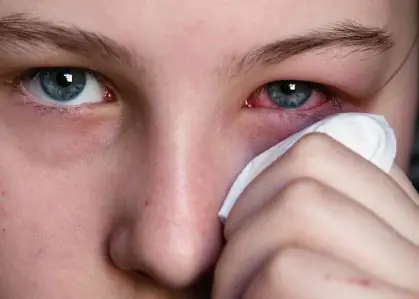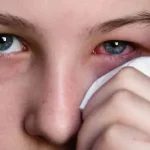Eye discharge, often called eye waste, is a common occurrence experienced by people of all ages. While typically harmless, excessive or persistent discharge can indicate underlying issues that require attention. If you’ve been wondering how to get rid of eye discharge, this guide will provide you with a comprehensive understanding of its causes, treatments, and prevention tips.
What is Eye Discharge?
Eye discharge, also known as eye mucus, is a combination of debris, oils, and cells produced by the eyes. This sticky substance often accumulates in the corners of the eyes, especially upon waking up. While normal discharge plays a protective role, excessive or abnormal discharge may signal an issue that needs medical attention.
Eye Discharge Is Also Called:
- Rheum: The scientific term for the eye’s natural discharge.
- Sleep: A colloquial term for dried mucus that forms overnight.
Types of Eye Discharge
Understanding the type of discharge can help identify the underlying cause:
White, Stringy Mucus in Eye
- Often linked to dry eye syndrome or allergies.
- Can result from excessive tear production or irritation.
Yellow or Green Discharge
- May indicate a bacterial or viral infection.
- Associated with conditions like conjunctivitis.
Watery Discharge
- Typically caused by allergies or viral infections.
Thick, Crusty Discharge
- Can result from blocked tear ducts or infections.
Common Causes of Eye Discharge
1. Conjunctivitis (Pink Eye)
- Inflammation of the conjunctiva caused by bacterial, viral, or allergic reactions.
- Symptoms include redness, swelling, and mucus from eyes.
2. Dry Eye Syndrome
- Occurs when the eyes don’t produce enough tears or when the tears evaporate too quickly.
- Results in irritation and white, stringy mucus in eye.
3. Allergies
- Triggered by pollen, dust, or pet dander, leading to watery and mucous-filled discharge.
4. Blocked Tear Ducts
- Common in newborns but can also affect adults.
- Causes an accumulation of tears and eye waste.
5. Blepharitis
- Inflammation of the eyelids that can result in crusty discharge and irritation.
How to Get Rid of Eye Discharge?
Managing and reducing eye waste involves a combination of home remedies and medical treatments, depending on the underlying cause.
Home Remedies
Warm Compress
- Helps soften and remove dried mucus.
- Reduces swelling and soothes irritated eyes.
- Soak a clean cloth in warm water.
- Gently press it over your closed eyes for 5–10 minutes.
Keep Your Eyes Clean
- Use a sterile cotton pad or soft tissue to wipe away discharge.
- Always wipe from the inner to the outer corner to avoid spreading bacteria.
Artificial Tears
- Relieve dryness and flush out mucus in eyes.
- Available over the counter or by prescription.
Avoid Allergens
- Identify and minimise exposure to triggers like dust, pollen, or pet dander.
Stay Hydrated
- Drink plenty of water to maintain tear production and eye hydration.
Medical Treatments
For persistent or severe cases, consult an eye specialist who may recommend:
Antibiotic or Antiviral Eye Drops: Prescribed for bacterial or viral conjunctivitis.
Medicated Ointments: Used for conditions like blepharitis to reduce inflammation and prevent infection.
Treatment for Blocked Tear Ducts: Involves gentle massage or minor surgical procedures to open the ducts.
Allergy Medications: Antihistamines or mast cell stabilisers to manage allergic reactions.
When to See a Doctor?
While occasional eye waste is normal, certain symptoms warrant medical attention:
- Persistent or worsening discharge.
- Yellow or green discharge with redness and swelling.
- Pain or sensitivity to light.
- Blurred or decreased vision.
Preventing Eye Discharge
Prevention is key to minimising the occurrence of excessive or abnormal discharge. Here are some tips for maintaining eye health:
Practice Good Hygiene
- Wash your hands regularly to prevent bacterial or viral infections.
- Avoid touching or rubbing your eyes.
Use Clean Towels and Makeup
- Ensure that towels and pillowcases are clean.
- Replace eye makeup regularly to avoid contamination.
Wear Protective Eyewear
- Use sunglasses or goggles to protect against dust and allergens.
Take Breaks from Screens
- Follow the 20-20-20 rule to reduce digital eye strain.
Schedule Regular Eye Check-Ups
- Routine visits to an eye specialist can help detect and manage potential issues early.
Eye discharge is a common condition that can range from harmless to indicative of an underlying problem. Understanding the causes and adopting proper hygiene and care routines can help maintain eye health. If you’re experiencing persistent or severe eye waste, seeking professional advice is essential for effective treatment.
Take the first step toward healthier, more beautiful eyes Book an Appointment with Centre for Sight in India!
Frequently Asked Questions
Eye discharge is caused by the natural cleaning process of the eyes, which expels debris, mucus, and oils. However, excessive discharge can result from conditions such as conjunctivitis, dry eyes, blepharitis, or infections like bacterial or viral conjunctivitis.
The best way to remove eye discharge is by gently wiping the eyes with a clean, damp cotton pad or cloth. For persistent or abnormal discharge, consult an eye specialist, as medical treatment like antibiotics or lubricating eye drops may be needed.
The discharge that accumulates in the corners of your eyes overnight is commonly called “eye crust” or “sleep.” Scientifically, it is called rheum, a mix of mucus, oils, and skin cells.
Bacterial infections like bacterial conjunctivitis typically cause yellow discharge. It can also result from a blocked tear duct, blepharitis, or eye injuries that have led to an infection. Immediate medical attention may be necessary to prevent complications.





